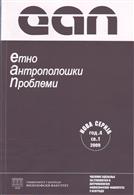Urgentnost antropologije spoljnih teritorija
The urgency of outer territories anthropology
Author(s): Miloš MilenkovićSubject(s): Museology & Heritage Studies, Recent History (1900 till today), Cultural Anthropology / Ethnology, Nationalism Studies, Identity of Collectives
Published by: Филозофски факултет, Универзитет у Београду
Keywords: urgent anthropology; collaborative ethnography; politics of knowledge; identity politics; Serbia; Belgrade; national interests; national dignity; applied social science and humanities;
Summary/Abstract: In the context of transforming a part of Serbian anthropology into social theoretic management of identity, I suggest both comparative historiographic and ethnographic learning from societies with similar post-colonial experience, with the aim to include the discipline into an urgent defense of Serbia and Belgrade from further ethno-profiteering interests of elites in/from outer territories, left over on the ruins of our ill judged, resource incompatible, exaggerated or immoral twentieth century adventures. Serbian anthropology, written by anthropologists to whom Serbia and Belgrade are "homeland" by origin or civilized choice, should play the key role in the defense of Serbian citizens from the interest of elites in/from the outer "homelands", particularly by revealing the processes for which it is, as a discipline, most expert at – the professionalization of ethnicity, interactive and hybrid nature of identity, instrumental nature of tradition and the identity politics in general. Having in mind the latest attempt, a particularly successful one, conducted by the end of the 20th and the beginning of the 21st century that the lives, health, well-being, dignity and future of persons born in and loyal to the interest of Serbia and Belgrade, in large scale, thoroughly and long term be sacrificed and dedicated to the interests of ethno-profiteering elites in/from outer territories, in this article I point to the possibility to, along with the comparative learning from the above mentioned post-colonial experiences, delicate experiences of urgent anthropology be applied as well as the rich tradition of collective research. This text analyzes the results of first such research, that represenst the initial, praiseworthy and a brave step in the wise striving to engage social sciences and humanities in a search of expert and not mythical/daily-political solutions of the key problem of the Serbian nation – that of how to settle the interests of the elites of population in/from outer territories sufficiently so that their local/regional problems or private interests can never again be treated as the national interest, nor be used as reasons for (self)destruction and(self)humiliation of Serbia and Belgrade.
Journal: Етноантрополошки проблеми
- Issue Year: 4/2009
- Issue No: 1
- Page Range: 213-221
- Page Count: 9
- Language: Serbian

